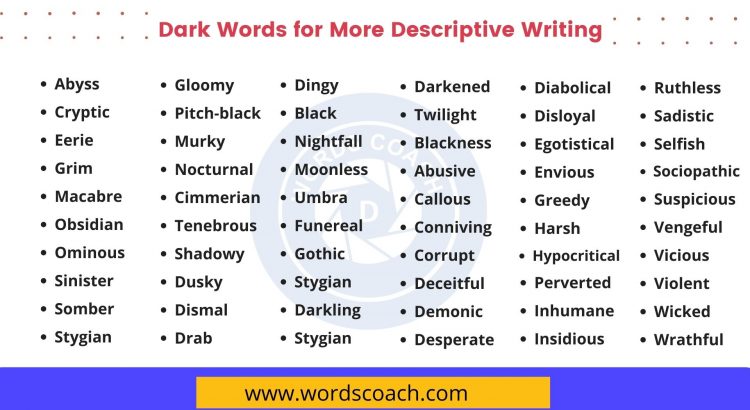Dark Words for More Descriptive Writing
When it comes to writing, sometimes we want to describe things in a more powerful and evocative way. One way to achieve this is by using dark words, which can add depth and richness to your writing. Dark words can be used to create a sense of foreboding, mystery, or danger, and can make your writing more memorable and impactful.
Here are some examples of dark words that you can use in your writing:
- Abyss – a deep, dark, and seemingly endless chasm or void, often used to describe a feeling of hopelessness or despair.
Example: He stared into the abyss of his own thoughts, feeling lost and alone.
- Cryptic – mysterious or puzzling, often used to describe something that is difficult to understand or decipher.
Example: The message was cryptic, leaving her to wonder what it meant.
- Eerie – strange and unsettling, often used to describe a feeling of unease or a spooky atmosphere.
Example: The old house had an eerie quality, making her skin crawl.
- Grim – depressing or bleak, often used to describe a hopeless situation or outlook.
Example: The future looked grim, with no sign of improvement in sight.
- Macabre – disturbing or gruesome, often used to describe something that is morbid or associated with death.
Example: The macabre painting of a skull on the wall gave her a sense of unease.
- Obsidian – dark and shiny, often used to describe a sharp or dangerous object.
Example: The obsidian knife gleamed in the dim light, its sharp edge glinting.
- Ominous – threatening or foreshadowing evil, often used to describe something that is likely to bring harm or danger.
Example: The dark clouds on the horizon were an ominous sign of the storm to come.
- Sinister – evil or malevolent, often used to describe a person or situation that is threatening or dangerous.
Example: The stranger’s sinister grin gave her a sense of unease.
- Somber – dark and gloomy, often used to describe a sad or melancholic mood or atmosphere.
Example: The somber music filled the room with a sense of sadness and loss.
- Stygian – dark and foreboding, often used to describe a place or situation that is associated with death or the underworld.
Example: The entrance to the cave was a stygian portal, leading to unknown depths.
Finding distinctive dark words can pose a challenge. The word ‘dark’ is multi-faceted and can be depicted in various ways. Picking the fitting words to capture the essence of darkness amplifies the creativity and efficacy of your writing.
Hunting for uncommon dark words can be a struggle. The term ‘dark’ encompasses numerous connotations and can be characterized diversely. Choosing suitable words to articulate darkness enhances the inventiveness and influence of your writing.
Scouting for exclusive dark words can be daunting. The word ‘dark’ is loaded with various meanings and can be portrayed in several manners. Opting for the appropriate words to convey darkness elevates the ingenuity and impact of your writing.
Words to Describe Darkness
| Abyss | Cryptic | Eerie |
| Grim | Macabre | Obsidian |
| Ominous | Sinister | Somber |
| Stygian | Gloomy | Pitch-black |
| Murky | Nocturnal | Cimmerian |
| Tenebrous | Shadowy | Dusky |
| Dismal | Drab | Dingy |
| Black | Nightfall | Moonless |
| Umbra | Funereal | Gothic |
| Stygian | Darkling | Stygian |
| Darkened | Twilight | Blackness |
Terms to Describe Dark Traits or Actions
Certainly! Here’s a table format for the “Terms to Describe Dark Traits or Actions” list:
| Abusive | Callous | Conniving |
| Corrupt | Deceitful | Demonic |
| Desperate | Diabolical | Disloyal |
| Egotistical | Envious | Greedy |
| Harsh | Hypocritical | Inconsiderate |
| Inhumane | Insidious | Malicious |
| Manipulative | Narcissistic | Perverted |
| Ruthless | Sadistic | Selfish |
| Sociopathic | Suspicious | Treacherous |
| Unscrupulous | Vengeful | Vicious |
| Violent | Wicked | Wrathful |
By incorporating these dark words into your writing, you can create a more vivid and memorable experience for your readers. However, it’s important to use these words judiciously, as too many can create a sense of overwhelm or melodrama. Use them sparingly, and in the right context, to make your writing more powerful and impactful.





